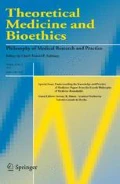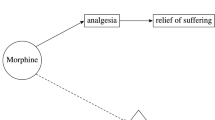Abstract
This paper is concerned with the moral justification for palliative sedation until death. Palliative sedation involves the intentional lowering of consciousness for the relief of untreatable symptoms. The paper focuses on the moral problems surrounding the intentional lowering of consciousness until death itself, rather than possible adjacent life-shortening effects. Starting from a Kantian perspective on virtue, it is shown that continuous deep sedation until death (CDS) does not conflict with the perfect duty of moral self-preservation because CDS does not destroy capacities for agency. In addition, it is argued that CDS can frustrate the imperfect duty of self-cultivation by reducing consciousness permanently. Nevertheless, there are cases where CDS is morally acceptable, namely, cases where the agent has already permanently lost the possibility for free action in advance of sedation—for example, due to excruciating and ongoing pain. Because the latter can be difficult to diagnose properly, safeguards may be needed in order to prevent the application of CDS for the wrong reasons.
Similar content being viewed by others
Notes
It has been discussed whether suicide can be undertaken from other motives than self-love—for example, in order to avoid the further degradation of humanity. But because palliative sedation is by definition applied for symptom relief (a motive of self-love), this issue will not be further pursued in this article.
For a more detailed discussion, see [10, p. 120].
For example, in some cases, this loss of communication skills is due to opioid-induced confusion and agitation which can be reduced by changes in medication administration. Applying CDS in these cases would be a moral (and medical) fault.
References
Morita, T., S. Tsuneto, and Y. Shima. 2001. Proposed definitions for terminal sedation. Lancet 358 (9278): 335–336.
Quill, T.E., B. Lo, and D.W. Brock. 1997. Palliative options of last resort: A comparison of voluntarily stopping eating and drinking, terminal sedation, physician-assisted suicide, and voluntary active euthanasia. JAMA 278 (23): 2099–2104.
Sykes, N., and A. Thorns. 2003. Sedative use in the last week of life and the implications for end-of-life decision making. Archives of Internal Medicine 163 (3): 334–341.
Muller-Busch, H.C., F.S. Oduncu, S. Woskanjan, and E. Klaschik. 2004. Attitudes on euthanasia, physician-assisted suicide and CDS—a survey of the members of the German Association for Palliative Medicine. Medicine and Health Care Philosophy 7 (3): 333–339.
Verkerk, M., E. van Wijlick, J. Legemaate, and A. de Graeff. 2007. A national guideline for palliative sedation in the Netherlands. Journal of Pain Symptom Management 34 (6): 666–670.
Materstvedt, L.J. 2003. Palliative care on the ‘slippery slope’ towards euthanasia? Palliative Medicine 17 (5): 387–392.
Rousseau, P. 2002. Author reply to careful conversation about care at the end of life. Annals of Internal Medicine 137 (12): 1008–1110.
Kristinsson, S. 2007. Autonomy and informed consent: A mistaken association? Medicine and Health Care Philosophy 10 (3): 253–264.
Sullivan, Roger J. 1989. Immaneul Kant’s moral theory. Cambridge: Cambridge University Press.
Guyer, Paul. 2007. Kant’s groundwork for the metaphysics of morals: A reader’s guide. London: Continuum.
Hill, Thomas E., Jr. 1992. Dignity and practical reason in Kant’s moral theory. London: Cornell University Press.
Louden, Robert B. 1986. Kant’s virtue ethics. Philosophy 61 (238): 473–489.
Hill, T.E., Jr. 2007. Kant on imperfect duty and supererogation. Kant-Studien 62 (1): 55–76.
de Vleeschauwer, H.J. 1966. La doctrine du suicide dans l’ethique de Kant. Kant-Studien 57 (1–3): 251–265.
Seidler, Michael J. 1983. Kant and the stoics on suicide. Journal of the History of Ideas 44 (3): 429–453.
Wittwer, Hector. 2001. Über Kants verbot der selbsttötung. Kant-Studien 92: 180–209.
Kant, I., P. Lauchlan, J. Heath, and J. Borges Schneewind. 1997. Lectures on ethics. Cambridge: Cambridge University Press.
Harris, J. 1995. Final thoughts on final acts. In Euthanasia examined: Ethical, legal, and clinical perspectives, ed. J. Keown, 56–62. Cambridge: Cambridge University Press.
O’Neill, O. 2002. Autonomy and trust in bio-ethics. Cambridge: Cambridge University Press.
Stratton Lake, P. 2008. Being virtuous and the virtues: Two aspects of Kant’s doctrine of virtue. In Kant’s ethics of virtue, ed. M. Betzler, 101–123. New York: Walter de Gruyter.
Velleman, J.D. 1999. A right of self-termination? Ethics 109 (3): 606–628.
Hill, Thomas E., Jr. 1991. Autonomy and self-respect. Cambridge: Cambridge University Press.
Hasselaar, J., C. Verhagen, A. Wolff, Y. Engels, B. Crul, and K. Vissers. 2008. Changed patterns in palliative sedation practice after the introduction of a national guideline. Archives of Internal Medicine (accepted).
Tannsjö, T., ed. 2004. Terminal sedation: Euthanasia in disguise? Dordrecht: Kluwer.
Acknowledgments
The author likes to thank Prof. Dr. Duwell, Professor in Bioethics at the University of Utrecht, Prof. Dr. Vissers, Professor in Palliative Care at the Radboud University Medical Center Nijmegen, and Prof. Dr. Van Leeuwen, Professor in Medical Ethics at the Radboud University Medical Center Nijmegen for their comments on a draft version of the paper.
Author information
Authors and Affiliations
Corresponding author
Rights and permissions
About this article
Cite this article
Hasselaar, J.G.J. Palliative sedation until death: an approach from Kant’s ethics of virtue. Theor Med Bioeth 29, 387–396 (2008). https://doi.org/10.1007/s11017-008-9088-7
Received:
Accepted:
Published:
Issue Date:
DOI: https://doi.org/10.1007/s11017-008-9088-7




